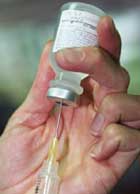Pituitary Tumor: Medicine
Pituitary Tumor: Medicine
When might medicine be used to treat a pituitary tumor?
For some kinds of small pituitary tumors, medicines may stop the tumor from growing. Or they can prevent it from affecting other parts of the body.
In some cases, medicine is the only treatment needed.
Medicines can’t destroy the tumor completely. But they can control its hormone production. And they can often make the tumor smaller.
What types of medicines are used to treat pituitary tumors?
The type of medicine used depends on the type of pituitary tumor. It also depends on the type of hormone, and how much of it, the tumor makes.
Nonfunctional pituitary tumors (null cell adenomas) don’t make any hormones. They are usually treated with surgery or radiation.
Tumors that make prolactin
These tumors are most often treated with medicines that stop them from making prolactin and help shrink the tumor. Many times medicine is the only treatment needed. The medicines most often used are:
Cabergoline
Bromocriptine
After a few months of treatment, tests will be done to see if the medicine is working. You will have blood tests to measure prolactin levels. You may also have an MRI.
Sometimes the tumor goes away, and the medicine can be stopped after a while. But you will be watched closely in case the tumor comes back. In other cases, you may need to take the medicine for the rest of your life.
Tumors that make somatotropin or growth hormone
These tumors are usually first treated with surgery. If hormone levels are still high after surgery, medicines may be used. These medicines are given as injections every month:
Octreotide
Lanreotide
Pasireotide
Pegvisomant (a daily injection that may be used if these other medicines don't work).
High doses of cabergoline or bromocriptine (both pills) may also be used.
Radiation may be used if these medicines don't work.
Tumors that make corticotropin (ACTH)
These tumors are often first treated with surgery and sometimes with radiation. Because it can take radiation a long time to work, medicines may be used in the meantime. Medicines don't work as well for these kinds of tumors. They often have serious side effects if taken over a long time. Medicines that may be used include:
Ketoconazole
Mitotane
Metyrapone
Aminoglutethimide
Cyproheptadine
Pasireotide
Etomidate
Mifepristone
If these medicines don't work, one of these may be tried:
Cabergoline
Bromocriptine
Tumors that make gonadotropin (FSH/LH)
These tumors are often large when they are found because the hormones they make don't cause any symptoms. Because of the size, surgery and maybe radiation afterward are preferred treatments. Regular scans will be done to see if the tumor comes back. If it does, radiation is tried. But if radiation was already used, these medicines might be given:
Cabergoline
Bromocriptine
Octreotide
Lanreotide
Tumors that make thyrotropin (TSH)
These tumors are often treated with surgery. Sometimes radiation is given after surgery. If there is still too much thyrotropin, medicines may be needed. Medicines most often used include:
Octreotide
Lanreotide
Cabergoline
Bromocriptine
What are common side effects of medicines used to treat pituitary tumors?
Side effects depend on which medicines are used. They can include things like:
Upset stomach (nausea)
Dizziness
Tiredness
Vomiting
Diarrhea or constipation
Depression
Headache
More serious, but less common side effects include:
Problems with the heart valves
Gallstones
Diabetes
Liver damage
Working with your healthcare provider
It's important to know which medicines you're taking. Write your medicines down, and ask your healthcare team how they work and what side effects they might have.
Talk with your healthcare providers about what signs to look for and when to call them. For example, some medicines can cause nausea and vomiting, which can be treated. Make sure you know what number to call with questions. Is there a different number for evenings and weekends?
It may be helpful to keep a diary of your side effects. Write down physical, thinking, and emotional changes. A written list will make it easier for you to remember your questions when you go to your appointments. It will also make it easier for you to work with your healthcare team to make a plan to manage your side effects.
Updated:
March 21, 2017
Reviewed By:
Gersten, Todd, MD,Stump-Sutliff, Kim, RN, MSN, AOCNS
